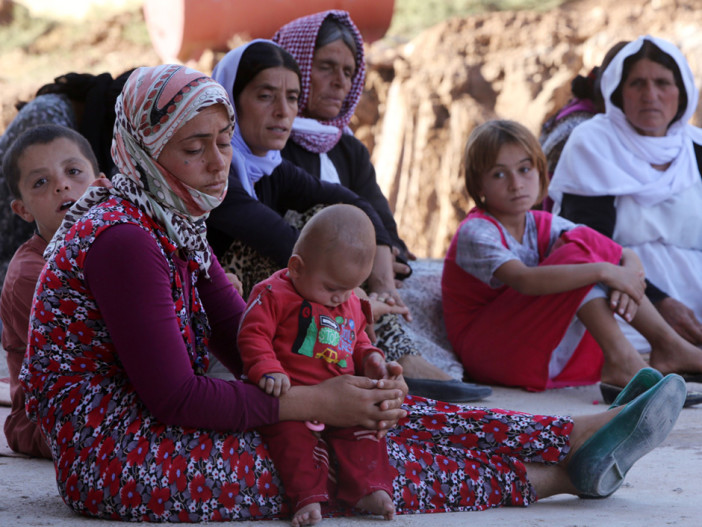Mass killings, systematic rape and enslavement have become the calling cards of the Sunni extremist group Islamic State in the parts of Iraq it now controls, the top UN human rights official said Monday. The group is committing “horrific” human rights abuses every day, Navi Pillay, the UN high commissioner for human rights said: “Such persecution would amount to crimes against humanity.”
“They are systematically targeting men, women and children based on their ethnic, religious or sectarian affiliation,” she said, “and are ruthlessly carrying out widespread ethnic and religious cleansing in the areas under their control.”
Among those targeted have been Christians, the Yezidi religious minority and Turkmens, she said. Among the abuses she outlined were:
– The killings of hundreds of Yezidi men and the enslavement of up to 2,500 women and children who refused to convert to Islam at the beginning of August in the northern province of Nineveh;
– The June 10 executions by gunfire of up to 670 non-Sunni prisoners taken from a prison as the Islamic State took Mosul, capital of Nineveh province;
– The August 15 killings and abductions of hundreds of Yezidis in the Nineveh village of Cotcho;
– The siege since June 15 of at least 13,000 members of the Shia Turkmen community in Amirli in the neighbouring province of Salah al-Din and fears of an imminent massacre there;
– The forcible recruitment by the Islamic State and affiliated groups of boys 15 and older as fighters.
“Such cold-blooded, systematic and intentional killings of civilians, after singling them out for their religious affiliation, may amount to war crimes and crimes against humanity,” Pillay said as she called for the perpetrators to be brought to justice.
Pillay’s statement came as dozens more died in violence across conflict-racked Iraq. Two car bombs blew up late Monday north of the capital Baghdad, killing at least seven people and wounding 18 others, the local news website Alsumaria reported.
Arab media quoting Iraqi medical sources put the death toll at 15 killed and 30 others wounded. The two blasts took place in the Attafiyeh neighbourhood. Earlier, ten civilians were killed and eight wounded when government air raids hit a residential district in the Islamic State-controlled city of Mosul, witnesses told dpa.
Air raids in Jalula, north-east of Baghdad, where Kurdish forces have been taking on the Islamic State, killed 20 of the extremist fighters, security sources said. In the capital, Baghdad, a suicide bomber blew himself up in a Shiite mosque, killing 17 people and wounding another 40, witnesses said.
A double car bomb struck the Shiite holy city of Karbala, south of Baghdad, killing at least eight people and injuring 12. Prime minister designate Haider al-Abadi said talks to form a broad national government were going well.
“The discussions with the political groups on the formation of the new government are positive and constructive,” Alsumaria quoted al-Abadi as saying.
President Fouad Massoum assigned al-Abadi to form a new government two weeks ago, over the objections of outgoing premier Nuri al-Maliki. Observers and Iraq’s Western allies blamed al-Maliki for hardline policies that alienated the Sunni Arab minority, from whom the Islamic State draws its support.
Al-Maliki was criticized for the rapid rout of Iraqi security forces when the Islamic State launched a lightning attack in June on Nineveh and other northern provinces.
Al-Abadi – a member of al-Maliki’s Islamic Daawa Party – said he was “committed to resolving the problems with the Kurdistan region through the constitution.”
Iraq’s central government and the autonomous Kurdistan regional government have for years been locked in disputes over oil resources and control of ethnically mixed areas.
The premier designate welcomed the recent coordination between Iraqi forces and the Kurdish Peshmerga, who in recent weeks have begun receiving direct military aid from Western countries.
The Islamic State turned its fury on the Kurds in early August, routing the Peshmerga from disputed areas, which they had taken over from Iraqi forces in June, and sending more than 200,000 civilians, many of them Yezidis and Christians, fleeing for their lives.
The group now controls much of Sunni Arab-populated western and northern Iraq as well as a swathe of territory in northern and eastern Syria.






 WhatsApp us
WhatsApp us 

